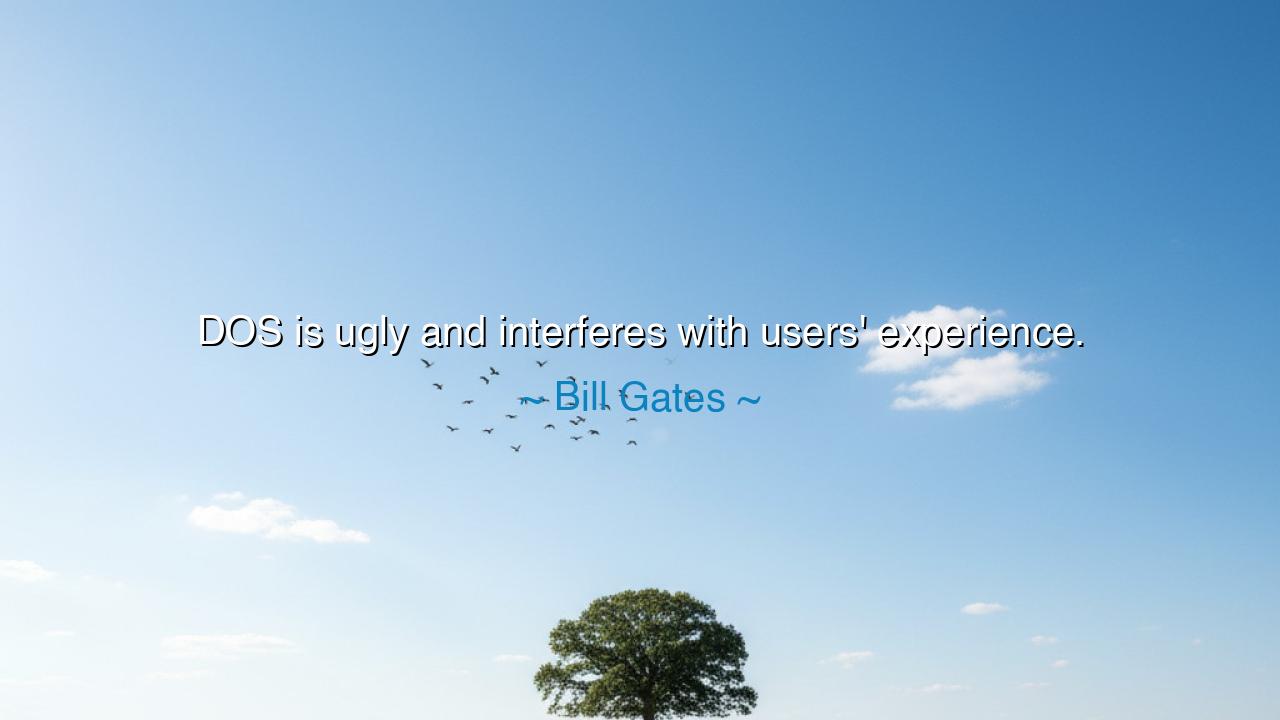
DOS is ugly and interferes with users' experience.






“DOS is ugly and interferes with users’ experience.” Thus spoke Bill Gates, the architect of the digital age, whose words here reveal more than a mere critique of software — they unveil a vision of harmony between humanity and technology, between mind and machine. To many, this sentence may appear technical, even mundane, yet beneath its surface lies a truth profound and eternal: that every tool we create must serve not the ego of its maker, but the ease and empowerment of its user. In these words, Gates speaks as one who has looked into the heart of progress and declared that beauty, simplicity, and understanding are not luxuries, but necessities for all human creation.
The origin of this saying reaches back to the dawn of personal computing, when the world of technology was still young and awkward, and the common person gazed upon it as one might gaze upon a foreign machine — powerful, but alien. In those days, DOS, the Disk Operating System, reigned supreme. It was efficient, yes, but also cold, mechanical, and uninviting. To use it required knowledge of hidden commands and cryptic symbols — it demanded obedience, not intuition. Bill Gates, visionary and reformer, saw that this distance between man and machine was unsustainable. He sought to build not merely systems, but experiences — to create a world where technology would not hinder, but elevate the human spirit.
In declaring that DOS was “ugly and interferes with users’ experience,” Gates was not only criticizing design; he was proclaiming a philosophy. He understood that beauty and function are one, that ugliness — whether in art, in language, or in code — obstructs the flow of understanding. A system that frustrates its user is not progress; it is regression. Thus began his mission to craft a world where technology would be as invisible as it was indispensable, where the machine would bend gracefully to the will of the human, and not the reverse. This was the seed that would grow into Windows, a new vision of computing — one guided not by commands, but by creativity.
His realization echoes a wisdom that the ancients themselves knew. The great architect Vitruvius, in the days of Rome, wrote that every structure must embody three virtues: firmitas (strength), utilitas (function), and venustas (beauty). Without beauty, a structure, though strong, fails to inspire. Without usability, it fails to serve. Gates applied this ancient principle to the modern world of machines. He knew that technology, too, must possess these same virtues — it must be sturdy in its foundations, useful in its design, and beautiful in its interaction. Only then could it become not a burden to mankind, but a companion to his purpose.
Consider the story of Steve Jobs, who shared this same devotion to harmony between technology and the human soul. When designing the first Macintosh, Jobs demanded elegance even in the parts unseen — the circuitry inside the computer that no user would ever touch. To him, every aspect of creation, visible or invisible, carried moral weight. Gates’s own journey mirrors this spirit: though he sought to democratize computing rather than enshrine it in luxury, he, too, believed that the experience must be central. Both men, in their rivalry, were guardians of the same truth — that technology without empathy is hollow, and that progress without design is chaos.
When Gates called DOS “ugly,” he spoke not of color or shape, but of experience — the bridge between creator and creation. “Ugly” is the system that forces the user to struggle. “Ugly” is the tool that demands subservience rather than collaboration. In this light, his statement becomes a moral declaration: that invention must honor those it serves. Every engineer, artist, and craftsman must ask — does this creation free the human spirit, or does it bind it? For if it binds, it is no longer creation, but tyranny.
The lesson is clear: in all that we build — whether in code, in stone, or in life — we must seek simplicity that empowers, and beauty that enlightens. Complexity that obscures is vanity disguised as intellect. Gates’s insight calls upon all who create to remember that the highest form of genius is clarity, not confusion. The world is not improved by what we make, but by how what we make allows others to live more fully, think more clearly, and dream more freely.
Therefore, my friends, let this teaching guide you: when you design, when you write, when you build, do so with reverence for the human experience. Let your work be as transparent as water, as graceful as light. Do not hide behind complexity — illuminate through simplicity. For as Bill Gates reminded the world, ugliness in creation is not an aesthetic failure, but a moral one. The true artist, the true innovator, creates in such a way that humanity does not strain to reach the tool, but finds the tool already waiting in harmony with the heart. And when that harmony is achieved — when beauty, purpose, and understanding unite — then we have not only advanced our machines, but honored our humanity.






AAdministratorAdministrator
Welcome, honored guests. Please leave a comment, we will respond soon